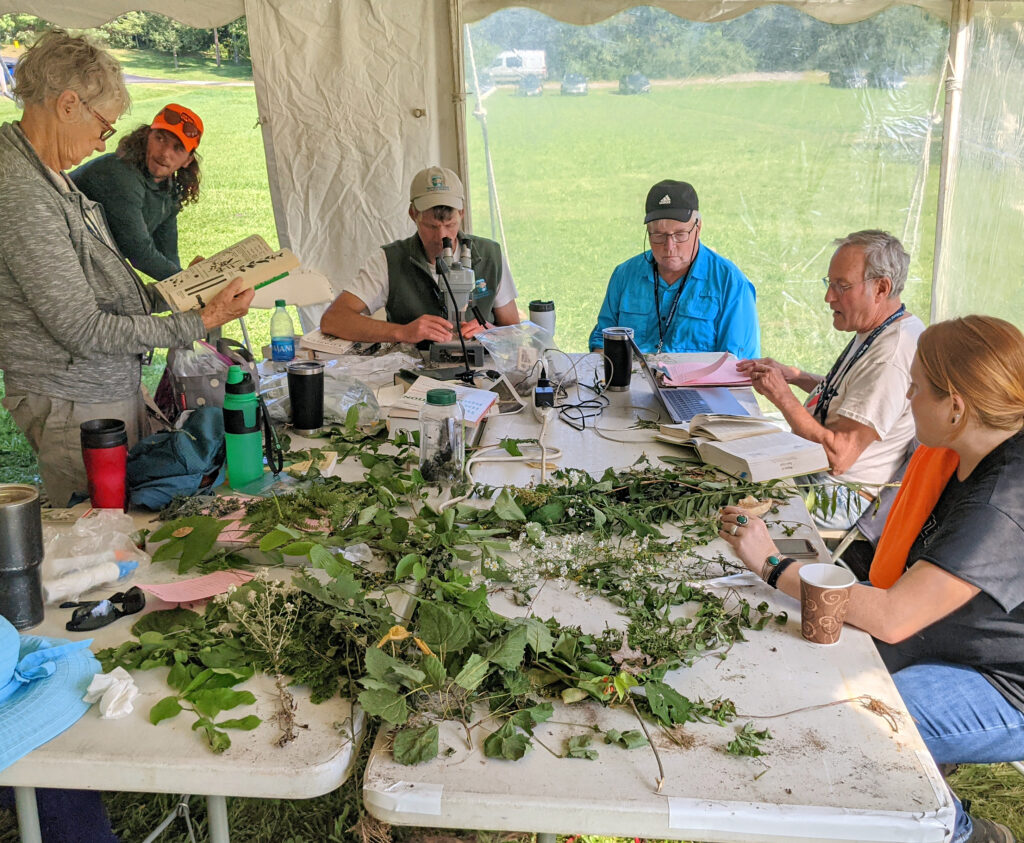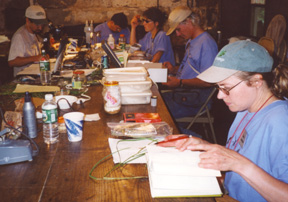
We use teams to help organize RI BioBlitz. Teams are organized a) taxonomically (birds, fungi, beetles), b) by habitat type (marine shoreline, leaf litter, freshwater aquatic), or c) by activity (art, writing, education, hosting). All participants must be assigned to a team during pre-registration, usually whatever taxon or habitat they specialize in or are most interested in.
Don’t know what team to sign up for or don’t consider yourself a “specialist” in any taxon? Don’t worry, when you register put down one or two teams that interest you. Every team could use a few enthusiastic beginners to schlep equipment or sort finds, and you will learn while you help. After you register, the Survey will connect you with your selected team(s).
During BioBlitz, you don’t have to stick with your assigned team the whole time. In fact, when it’s slow for your team (daytime for moths, nighttime for bees) you can jump in with another team and learn what they’re doing. It’s all part of the BioBlitz learning experience.
The exact teams vary from year to year depending on where the event is and who attends. Some teams might be focused narrowly (bees or ants, for instance), others might be broad (e.g. plants or fungi). The organization that goes into each team comes largely from the team captain and its members, not the Natural History Survey. Team captains may or may not be taxonomic experts but they are at least enthusiastic and willing to help organize a team. There is no “right way” to organize a team.
BioBlitz Teams
Here are teams for a typical RI BioBlitz, with names where they’ve been established by past teams. If you want to work in a new team or a sub-taxon of an existing one, let us know. Some years we won’t have every team and we never know the size of the teams until registration time.
- Art [Art Team]
- Creative Writing Team
- Microscopic Unicellular Organisms Other Than Algae and Fungi
- Vascular Plants [The Plantathletes]
- Algae (Freshwater and Terrestrial) [The Phycophreaks]
- Algae (Marine)
- Mosses [The Standing Stones]
- Lichens [The Cladonia Crazies]
- Fungi [The Fun-Guys]
- Mollusks[The Muckrakers]
- Terrestrial Soil Macro-invertebrates [The Litterbugs]
- Spiders & Kin [The Creepy Crawlies]
- Crustaceans & Kin [The Crabby Crawlies]
- Beetles [The Beetleers]
- Flies (incl. Mosquitos)
- Dragonflies/Damselflies
- Butterflies
- Moths [The Night Knights]
- Ants
- Bees
- Misc. Insects
- Reptiles & Amphibians [The Herpetophiles]
- Fish [The Aquaverts]
- Birds
- Mammals
BioBlitzers should submit all their finds via the correct team (birds with the bird team, butterflies with the butterfly team, etc.). This helps eliminate duplicates. If you are on the bird team and find an interesting plant or beetle, bring it to the attention of the appropriate team and have them add it to their list; don’t add snails to your bird list or turtles to your moss list.
Teams can submit observations in two ways: 1) using a taxonomic checklist (there are a number available through the Survey’s Resource Library, keyword “checklist”) or 2) on the team’s RIBORF (the pink Rhode Island BioBlitz Observation Reporting Form (aka “RIBORF”). Individuals can also submit finds via iNaturalist by joining the BioBlitz’s iNaturalist project and submitting photos to iNat. We will download the iNaturalist finds and integrate them into the event list afterwards. Go to inaturalist.org and search “Rhode Island BioBlitz [YEAR]”.

In order to help assemble teams to cover the widest range of possible species, we developed a RI BioBlitz Reference Taxonomy. Many levels of organization have been left off and some older groupings retained. The goal is to simplify the presentation and focus on taxa that the scientifically literate public would be most familiar with. The document is helpful, too, for reminding participants to keep their eyes open for obscure, interesting, or often overlooked creatures.
BioBlitz is a weird sort of game, and to increase the fun we track the performance of each team against the theoretical maximum number of species in their taxon and against the RI BioBlitz average and record high and low for their taxon. At the closing announcement every year we recognize teams that set new records and find the highest percentage of the theoretical maximum. If you’re setting goals for your team, here’s the list of all Rhode Island BioBlitz Results 2000-2021.